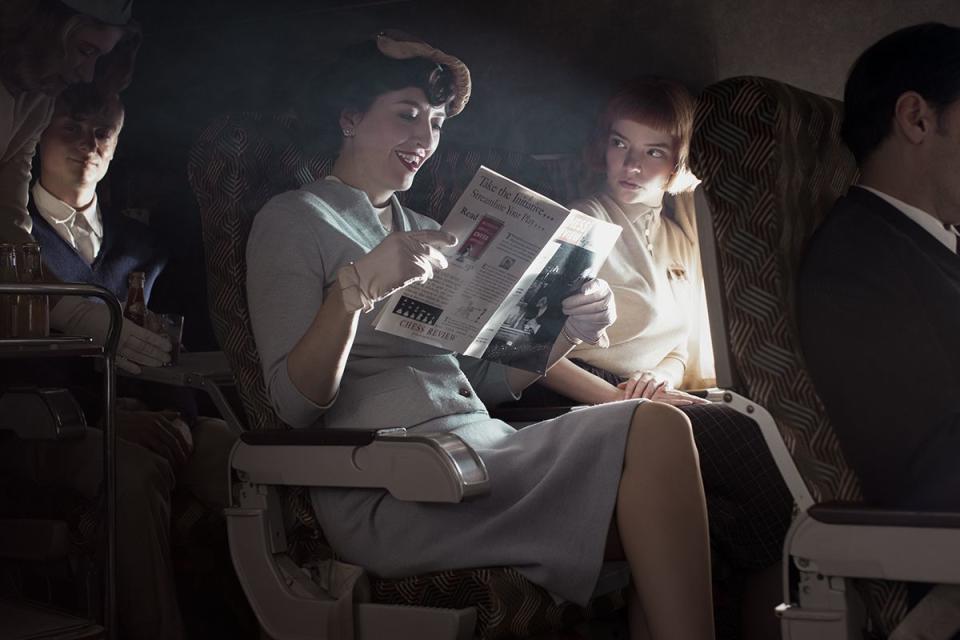Marielle Heller on Playing Beth Harmon’s "Tragic" Mother in The Queen’s Gambit

In recent years, the bulk of Marielle Heller’s work has been done from behind the camera. She’s the director of movies including What the Constitution Means to Me, Can You Ever Forgive Me?, A Beautiful Day in the Neighborhood, and The Diary of a Teenage Girl, and has helmed episodes of TV series including Transparent. But The Queen’s Gambit convinced Heller—who had previously appeared in MacGruber and A Walk Among the Tombstones—to give acting another shot.
On the Netflix series, Heller plays Alma Wheatley, the adoptive mother of Anya Taylor-Joy’s Beth Harmon, a troubled chess prodigy—she's fictional, but with influence from real life players—coming of age in the 1950s and ’60s. The bond the two share isn’t a typical mother-daughter relationship, but instead a kind of partnership built out of a fragile trust and shared troubles. Both women grapple with addiction, but Alma finds meaning in helping Beth achieve the kinds of goals she herself never could. Here, Heller tells T&C about why the relationship made her want to act again, and why it was a relief to give up the director’s chair.

It’s been almost a decade since we’ve seen you on screen—more recently you’ve been making more movies, like What the Constitution Means to Me, A Beautiful Day in the Neighborhood, and Can You Ever Forgive Me? What made you want to be an actor in this show?
I’m friends with [show runner] Scott Frank. We met at the Sundance Labs, and he was an advisor on my first movie, The Diary of a Teenage Girl. We’ve stayed friends through the years; we watch first cut of each other’s movies and things like that. A few years ago, on a sort of lark, I did a tiny part in his movie A Walk Among the Tombstones. I got pretty much cut out of the movie, but it did make him say, “whoa, she’s actually an actor—I’m going to keep that in mind.” He tried to get me to be in [his series] Godless, but I was making Can You Ever Forgive Me? and couldn’t do it. So, when he came to me for this project, I had no excuse. I read the script and was so blown away by Alma; she’s complex and rich and seemed like such a challenge. I thought, why not?
So, on the heels of directing two films, you decided to take it easy by starring in a TV series?
The truth is compared to directing, acting is much less of a commitment. When you direct a movie, it's two years of 24 hours a day living, breathing, thinking about this project. With an acting role, it's more like a few months and there were days I didn't even have to go to set. The responsibility level was a lot lower.
What about Alma was compelling for you? She and Beth develop a unique relationship, but at first, it’s not clear that things between them are going to work out.
There’s such a sweet bond that ended up happening between them, it’s almost best that you really don't see it coming. You know, in the movies that I write and direct, I really look for characters, particularly female characters, who are complex and surprising and who hold many truths at one time. Part of what I loved about Alma was she was like that. She is somebody who lives with a huge amount of pain—she has this dream that she never was able to fulfill of being a pianist, she wanted to be a mother and she was never able to fulfill that, she's living in a loveless marriage. She's really a victim of her era, there’s something so tragic about her and yet she's resilient: she's smart, she's cunning. She has this other side to her that gets woken up by seeing Beth pursuing her dream.
What was it like to be directed when you’re used to being the person in that seat?
It was a joy because I trust Scott. I don't think I could have said yes to something like this if I didn't really trust the director, because I would have felt the need to step in. It was also sort of a relief. I would have these jokes with Scott, who would always fill me in on everything that was happening. We'd show up to a new set and he'd talk to me about effects or something similar and I’d say, “Scott, that’s not my problem. I'm not going to your VFX meeting. I don't have to.” I was just there to act, and that was great. I reveled in the fact that those things were not my responsibility; that felt great.

Your character’s one of the few in the series who’s not a chess player. Did you manage to pick up any interest in the game?
No, I don't know anything about chess. My five-year-old is better at chess than me. He and my husband both started learning while we were in Berlin filming the show, which I thought was great. My character didn't play chess, so I didn't have to learn, but I have to say I was a little nervous about how people like me who don't know anything about chess would feel about the show—would they be able to get invested in it?
I was so blown away when I saw the series, how emotional the chess playing is, whether you know the game or not. Like with any good sports movie, you get so invested in Beth as a character that you really care about her game and the psychology behind it. So no, I am not a chess player. But there's a lot of this quarantine left, so maybe I'll pick it up.
You Might Also Like


